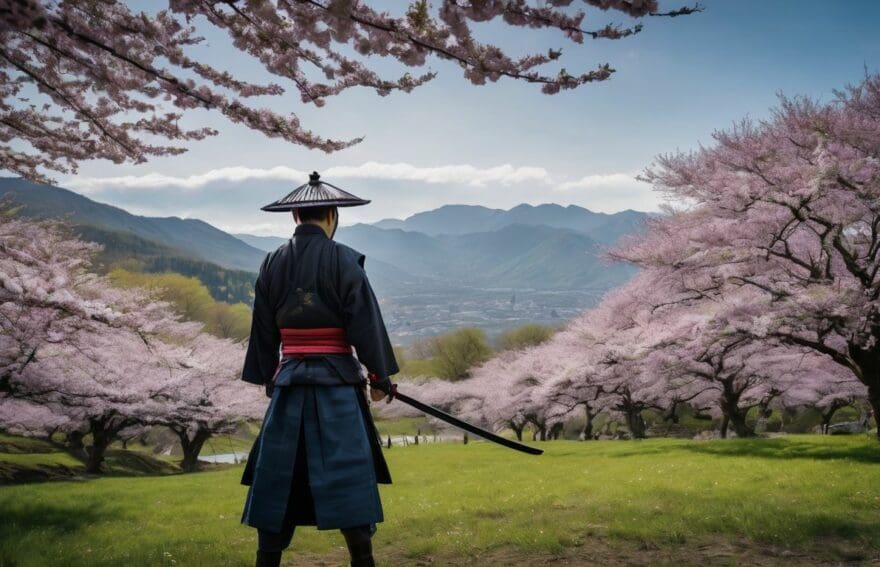Honour and Rebellion in Ghost of Tsushima’s Samurai Tale

Updated On: November 19, 2025 by 
Delving into the spellbinding narratives of honour and rebellion often leaves us contemplatively weighing up where we might place ourselves within such mighty ideological skirmishes.
We’re no strangers to this fascination, particularly as it’s so eloquently depicted in the enthralling storyline of Ghost of Tsushima. In our latest blog post, we take an intimate look at Jin Sakai’s odyssey, meticulously peeling back layers to reveal how his mission tests the samurai code to its core.
It prompts a question many of us seldom dare ask—what does it mean to forgo tradition when survival hangs precariously in the balance? Join us as we explore a saga that deftly braids courage with dissent, and who knows—you may just find out where your own convictions lie amidst these time-honoured ideals.
The Story of Jin Sakai
Jin Sakai, the protagonist of Ghost of Tsushima, grapples with his own sense of honour as he navigates the chaos of the Mongol invasion. His journey to find his own code of conduct is deeply intertwined with the Yarikawa Rebellion, a pivotal event in the game’s narrative.
His struggle to find his own code of honour
In Ghost of Tsushima, we follow our protagonist as he grapples with a personal crisis. Bound by the traditional Samurai Honor Code, he sees his homeland ravaged by Mongol invaders and realises that conventional tactics won’t suffice.
This internal conflict propels him to adopt unconventional methods, assassinations and guerrilla warfare, which starkly contrast with the way of the samurai he was taught to revere.
Our hero’s journey is marked by tough choices and moral dilemmas. He must balance his loyalty to Clan Shimura with the desperate need to defend Tsushima at any cost. His honour bends under this pressure; not broken but reshaped into a code unique unto himself—a fusion of tradition and innovation that challenges stalwart beliefs about bravery and devotion in the face of an unprecedented threat.
These are testing times when our sense of righteousness is put on trial alongside Jin Sakai’s very soul.
The role of the Yarikawa Rebellion
The Yarikawa Rebellion, a turning point in the game’s narrative, was a revolt led by Clan Yarikawa against the rule of Clan Shimura approximately two decades before the Mongol invasion.
This rebellion significantly shaped the relationships between different factions on Tsushima and continues to influence the island’s dynamics. The consequences of this conflict are evident throughout Ghost of Tsushima, as it highlights the enduring impact of historical events on both individual characters and broader society.
Ultimately, Jin Sakai’s journey is deeply intertwined with this pivotal moment in history, shaping his understanding of honor and leading him to question traditional samurai values in response to changing circumstances.
The Conflict Between Clans
The rivalry between Clan Shimura and Clan Yarikawa plays a significant role in the power dynamics of Tsushima, affecting not only the samurai but also the everyday lives of its people.
The underlying tension and struggle for dominance are key factors in Jin Sakai’s journey to find his own path amidst conflicting loyalties.
Clan Shimura vs. Clan Yarikawa
The rivalry between Clan Shimura and Clan Yarikawa marks a significant turning point in the history of Tsushima. Roughly twenty years before the Mongol invasion, the Yarikawa Rebellion saw Clan Yarikawa rise against Clan Shimura’s rule.
This event shaped the power dynamics on the island, leading to tensions that still reverberate throughout Jin Sakai’s journey. The consequences of this conflict are deeply intertwined with the narrative and relationships within Ghost of Tsushima, making it a pivotal aspect of understanding the game’s complex web of loyalties and betrayals.
Clan Shimura and Clan Yarikawa continue to influence Tsushima’s shifting landscape even amidst external threats. As players navigate through their choices as Jin Sakai, they will encounter characters weighing their allegiance against personal values in light of past conflicts between these two powerful clans.
The underlying tension and power dynamics
Clan Shimura and Clan Yarikawa have a turbulent relationship, stemming from the Yarikawa Rebellion twenty years prior to the Mongol invasion. The rebellion caused a rift between the two clans, leading to underlying tension that affects their interactions and power dynamics on Tsushima Island.
This tumultuous history plays a pivotal role in shaping the narrative of Ghost of Tsushima, impacting the decisions made by characters and stirring conflict among the people of Tsushima.
The power struggle between these clans deeply influences Jin Sakai’s journey as he navigates through this complex web of loyalties and rivalries. His choices reflect the delicate balance between honor, allegiance, and rebellion against tradition, adding layers of depth to his character development throughout the game.
Effect on the people of Tsushima
After delving into the underlying tension and power dynamics between Clan Shimura and Clan Yarikawa, it becomes apparent that the effects on the people of Tsushima were profound. The Yarikawa Rebellion resulted in a fractured community, with its members subjected to increased hardship and suffering due to internal conflict.
As tensions mounted, their lives were inevitably shaped by the struggle for power and control. This division left lasting scars on the island’s inhabitants as they endured the consequences of rebellion within their own ranks.
The aftermath of this conflict is evident in the sense of loss and disillusionment experienced by Tsushima’s people. Their loyalties torn between clans, they grappled with uncertainty about their future under opposing powers.
Honour in the Samurai Code
The samurai code of honour, or “bushido”, is a central theme in Ghost of Tsushima. Loyalty, respect, and self-sacrifice are all integral to the traditional values upheld by Jin Sakai and his fellow warriors.
Loyalty
Loyalty is a central theme in Ghost of Tsushima, shaping the choices and relationships of its characters. Jin Sakai’s internal conflict between loyalty to his uncle and mentor, Lord Shimura, and his own moral compass drives much of the narrative.
The Yarikawa Rebellion also highlights the complexity of loyalty as Clan Yarikawa’s defiance against Clan Shimura reveals the blurred lines between allegiance and individual belief.
Through Jin’s journey, players are confronted with the question of where their true loyalties lie – to tradition or personal conviction.
The game expertly portrays the multifaceted nature of loyalty within the samurai code while challenging players to consider its broader implications. As Jin navigates conflicting loyalties throughout his quest, he sheds light on how blind adherence can lead to moral ambiguity and internal strife.
Respect
In Ghost of Tsushima, the concept of respect is deeply ingrained in the samurai code. Samurai are expected to show respect not only towards their superiors but also towards their enemies and the people they protect.
This idea of respect is central to Jin Sakai’s internal struggle as he navigates between traditional samurai values and his own evolving sense of honour. The game vividly portrays how respect plays a crucial role in shaping characters’ decisions and relationships, adding depth to the narrative and immersing players in the complexities of samurai culture.
The theme of respect also extends beyond personal interactions, manifesting in the reverence for tradition, ancestors, and one’s place within society. Moreover, it prompts players to consider how respecting cultural heritage can both preserve identity and limit growth or change.
Self-sacrifice
The concept of self-sacrifice is deeply ingrained in the samurai code, reflecting honour and duty above personal gain. In Ghost of Tsushima, Jin Sakai demonstrates self-sacrifice as he goes against traditional samurai values to protect his people from invasion.
By setting aside his own desires, Jin embraces risk and danger for the greater good of Tsushima’s inhabitants. This selflessness exemplifies the internal conflict between adhering to tradition and doing what is necessary for survival in a changing world.
Jin’s act of self-sacrifice challenges players to consider whether blind adherence to tradition or adapting with the evolving circumstances carries more weight on the scale of honour.
Rebellion as a Weapon
The Yarikawa Rebellion serves as a symbol of resistance against the invading forces on the island of Tsushima, showcasing the consequences for those who choose to rebel. To learn more about how honour and rebellion intertwine in Ghost of Tsushima’s Samurai Tale, keep reading!
The Yarikawa Rebellion as a symbol of resistance
The Yarikawa Rebellion serves as a powerful symbol of resistance against the oppressive rule of Clan Shimura. The brave defiance displayed by Clan Yarikawa resonates deeply with the people of Tsushima, highlighting their unwavering spirit in the face of adversity and tyranny.
This pivotal event not only represents a stand against injustice but also showcases the resilience and determination of those who refuse to submit to unjust authority.
This historic rebellion demonstrates that when faced with oppression, individuals and clans can unite to challenge subjugation and fight for their freedom. The legacy of the Yarikawa Rebellion reverberates throughout Ghost of Tsushima, inspiring characters like Jin Sakai to question traditional beliefs and take a stand for what they believe is right.
The consequences for those who rebelled
The rebels of Clan Yarikawa faced severe repercussions from the ruling Clan Shimura after their failed uprising. Many were executed, while others faced exile or imprisonment. The consequences echoed through the generations, leaving a lasting impact on both clans and the people of Tsushima.
The aftermath of the rebellion serves as a stark reminder of the harsh realities faced by those who dared to challenge established authority.
Reflecting on these historical events provides important insights into the power dynamics and struggles within Ghost of Tsushima’s narrative, shedding light on themes of loyalty, honor, and sacrifice that define the characters’ decisions and relationships.
Reflections on Honour and Rebellion
The impact of the samurai code on the characters and their decisions, the consequences of blind adherence to tradition and the importance of finding a balance between honour and rebellion are all key aspects that we will explore in this blog.
So come along with us as we dive deeper into this captivating tale!
The impact of the samurai code on the characters and their decisions
The samurai code heavily influences the characters in Ghost of Tsushima, affecting their decisions and actions throughout the game. Jin Sakai feels torn between upholding the traditional values of honour, loyalty, and self-sacrifice, as expected by his uncle Lord Shimura, and his growing need to adapt to new tactics in order to combat the Mongol invaders.
This internal conflict leads Jin down a path that challenges the conventional samurai code, forcing him to make difficult choices that often defy tradition.
Jin’s struggle reflects a larger theme within the game – the tension between honour and rebellion. As players navigate through his story, they witness how adherence to tradition can lead characters like Jin down a path fraught with dilemmas and moral ambiguity.
Consequences of blind adherence to tradition
The impact of the samurai code on the characters and their decisions highlights the consequences of blind adherence to tradition. Jin Sakai’s struggle to find his own code of honour reflects the dangers of rigidly following established norms without considering individual circumstances.
The repercussions faced by those who rebelled against Clan Shimura, especially in the case of Yarikawa Rebellion, shed light on the negative outcomes that can arise from blindly adhering to traditional beliefs and practices, emphasising the importance of critically evaluating these principles in a changing world.
The importance of finding a balance between honour and rebellion.
Consequences of blind adherence to tradition can lead to stagnation and inflexibility within a society, hindering its ability to adapt and grow. On the other hand, outright rebellion without any regard for tradition or honour can lead to chaos and instability.
Therefore, it is crucial to find a balance between honour and rebellion in order to navigate change while upholding principles of integrity and respect. In Ghost of Tsushima, this delicate equilibrium is exemplified through Jin Sakai’s journey as he grapples with the conflict between adhering to the samurai code of honour and embracing unconventional methods to protect his people from invasion.
This exploration underscores the significance of striking a harmonious coexistence between tradition and innovation.
In navigating this theme, Ghost of Tsushima invites players into an introspective examination of how individuals reconcile their personal values with larger societal expectations. As gamers delve into Jin Sakai’s moral dilemmas, they are prompted to consider the implications that ensue when tradition clashes with necessary adaptation.
Conclusion
In conclusion, Ghost of Tsushima’s portrayal of honour and rebellion in the samurai tale offers a compelling exploration of the struggle to uphold tradition while facing the need for change.
The Yarikawa Rebellion serves as a symbol of resistance, highlighting the complexities and consequences that come with challenging established power dynamics. Through Jin Sakai’s journey, players are encouraged to reflect on the role of heroism, loyalty, and self-sacrifice within the context of war and personal growth.
The game provides an immersive experience that delves into historical themes while inviting audiences to contemplate timeless questions about ethics and adherence to tradition.
FAQs
1. What is “Ghost of Tsushima’s Samurai Tale” about?
“Ghost of Tsushima’s Samurai Tale” is a story that explores themes of honour and rebellion, focusing on the heroism of samurais.
2. Can you tell me more about the honour in this Samurai tale?
In this tale, honour represents the core value that guides the samurais’ decisions and actions throughout their journey.
3. Does rebellion play a significant role in “Ghost of Tsushima”?
Yes, rebellion is a key element as characters challenge traditional codes to protect their home during trying times.
4. What can we learn from the samurai’s heroism?
The tale teaches us about bravery and sacrifice—showing how true heroes act with courage to uphold their beliefs.









